Spotlight your law firm with SEO marketing for attorneys.
SEO for DUI Attorneys
Individuals facing a DUI charge are going to seek out the best attorney or law firm in their area as fast as possible.
And who is that perfect attorney? Well, it sure ain’t Saul Goodman. It’s you!
We know it, and you know it, but does your community know it?
This is where things get complicated. You may be the Gregory House of DUI law, but if you don’t have the right platform to make your case to those who need you the most, your competition will scoop up all of your prospective clients.
We certainly can’t let that happen, and that’s why you need the right SEO agency for DUI attorneys working on your side.
#1
Ranking Nationally
475+
SEO case studies
12,000+
Leads Generated
100+
Verified Reviews
Get A Free SEO Plan


Table of Contents
- 1 What is SEO?
- 2 How Does SEO Work For DUI Attorneys?
- 3 SEO Marketing for Attorneys: Explained in Three Steps
- 4 Featured Projects
- 5 Is That Everything? What Other Things Should DUI Attorneys Do For SEO?
- 6 You Need a DUI Attorney SEO Agency
- 7 Coalition Technologies – A SEO Firm Specializing In Attorneys
- 8 Related Resources
What is SEO?
SEO, or search engine optimization, is simply the process by which your website rises from digital obscurity and reaches the highest heights of search engine exposure. Search Engine Journal reports that 29 percent of web surfers click on the first result, so if you can’t break that all-important top 3, your online presence will amount to very little.
SEJ also notes that SEO leads have a 14.6 percent close rate, while traditional leads (like print advertising) have less than a 2 percent close rate.
Why the disparity in the close rate? SEO leads are what marketers consider “warm leads” – they’re looking for a law firm when they need one. Print or television advertising, even in a connected era, often amounts to a spray-and-pray type of strategy.
In other words, SEO is much more than just a good idea. It’s vital to your success as a DUI attorney or lawyer.
WE’RE THE LEAD GENERATION SEO EXPERTS YOU’RE LOOKING FOR:
#1 Ranked Los Angeles SEO Company
Top Reviewed SEO Agency On Yelp
Google Ads Certified Partner
97% Client Retention Rate
99% Client Satisfaction Rate
Call us at (310) 827-3890 or Email Us
How Does SEO Work For DUI Attorneys?
Let’s say that you’re the most skilled and knowledgeable DUI lawyer in Los Angeles. You enter the phrase “Los Angeles DUI Lawyer” into the Google search engine, and find that your firm appears on page 2, ranked number 14. You have thirteen attorneys ranking ahead of you, rendering your website virtually invisible.
With the right SEO campaign, you can climb your way onto the first page and, with time, even to that coveted number 1 spot. As you increase in positioning, both the volume and quality of leads will increase.
Why? First, most people don’t scroll further down search results pages (SERPs) if they see something they’re interested in higher on the page. Second, people who scroll further down a page are more likely “shopping” for an attorney. They may be chasing the lowest-priced lawyer, putting you in competition with a handful of other attorneys for their business.

SEO
Search Engine Optimization
Higher Page Rankings
On Search Engines like Google
Increased Traffic
To your website
Increased ROI
Return On Investment
SEO Marketing for Attorneys: Explained in Three Steps

What’s the First Step in SEO for Law Firms?
Before you start diving into the actual SEO work, we highly suggest ensuring that your website has Google Analytics 4 installed AND has Google Search Console up and running.
Why should these two things be your first tasks to tackle?
Simple—you’ll never really know if your SEO is working if you can’t get accurate reporting, and Google provides these free tools to you, to help you get exactly that. Setting up Google Analytics and Google Search Console is pretty easy to do, and most website Content Management Systems (CMSes) will have plugins or built-in features that let you do it without knowing any code.
To set up Google Analytics and Google Search Console, you’ll need a Google account (often a simple Gmail account will do the trick). Make sure that you save the password someplace secure, if you don’t use the Gmail or G Suite (Google’s professional email and productivity software) account regularly, so you don’t lose it. Also, make sure you have account recovery setup with your regular email.
Here are a few helpful links on setting up Google Analytics, and Google Search Console:
If you want to be more ‘advanced’ you can also set up Google Tag Manager to help manage all of your tracking pixels and codes going forward:
And if you need it, here is where you can create your Google account / Gmail account:
- Create Gmail Account
- Create G Suite Account (highly recommended if you are not currently setup with another productivity suite or if you don’t have your own ‘branded’ email address like @mylawfirmname.com)
Below are some links to help you set up Google Analytics and Search Console on common content management systems (CMSes) used by lawyers:
WordPress Setup:
Squarespace Setup:
Wix Setup:
Drupal Setup:
Most content management systems should have help documents, so if you don’t use one of the CMSes above, then do a quick Google search, and you should be able to locate something for your site. Depending on your CMS, you’ll also want to set up Goals or Events for your Google Analytics account so that you can track if someone called you from a particular marketing channel or if they submitted a contact form as a result of a particular marketing effort
Now, if you’re already pretty peeved with the instructions included above, you can always just contact us and we’ll do it for you. Seriously! We provide a complementary setup of Google Analytics and Google Search Console for DUI lawyers. We just ask that you leave some feedback on our work for you, and keep us in mind if you decide you want ongoing professional support.
Final warning on this topic: Never hire an SEO company for lawyers that wants to be the owner of your Google Analytics or Search Console accounts. Make sure that they explicitly state that you’ll be the permanent owner of these accounts in their contract or in writing before you sign.
Many shady digital marketers will hold these accounts hostage to try and force you to continue paying them, or to make it harder for a more reputable SEO agency to help you out.
Seriously, just don’t hire companies like this, no matter how cheap or how great the sales pitch is. If they have to resort to extortion to keep their clients, chances are they’re not someone you want to work with.
What data should DUI attorneys pay attention to in Google Analytics and Google Search Console?
The most important data that you’re going to want to evaluate in Google Analytics is (a) traffic by source and (b) goal completion by source.
There are TONS of other reports and data sets that you can mine in Google Analytics if you have the time. Still, for most attorneys, traffic by source and goals by source are the most important to understand and monitor in Google Analytics.
Traffic by source is a report that shows how traffic to your site changes over time based on what marketing channel (or source) is driving traffic to your website. Note that in Google Analytics, you’ll see both the terms ‘channel’ and ‘source’ used. They essentially mean the same thing, although typically, ‘Channel’ refers to a broader category of marketing drivers, and ‘Source’ refers to the more granular marketing drivers.
For example, your law firm website could receive Channel traffic from “Organic Search” and Source traffic from “Google.” The Channel traffic report for Organic Search will include Google’s search engine, as well as Bing’s and other popular ones online.
Here’s how to view your traffic by source in Google Analytics:
From your initial dashboard, click on Reports in the left sidebar menu.
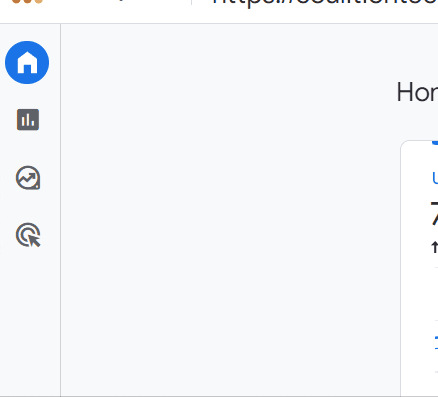
From Reports, goto Business objectives > Generate leads
And then click on Traffic acquisition.
Once there, you should see the traffic performance over a recent period. The default should be 28 days. You’ll see other data such as the number of Users (unique devices that have visited your site) and Sessions (how many occurrences where someone has browsed your site), and behavioral metrics such as Session Duration, Engagement rate, Event Count, and more.
It’s good to familiarize yourself with these report views and what the particular reporting elements mean. The more knowledgeable you are, the more you’ll be able to interact and provide feedback on an SEO campaign for your law practice.
What about Google Search Console?
There are plenty of really helpful reports for Google Search Console, ranging from error reports (which identify problems with how Google perceives your site) to ranking reports. The latter is the most important to get comfortable with if you’re just starting out in SEO for your DUI practice.
How do you check that out?
Once you’ve logged into Google Search Console, simply click on the ‘Performance’ tab in the left-hand menu, and you’ll see a dashboard like this one:
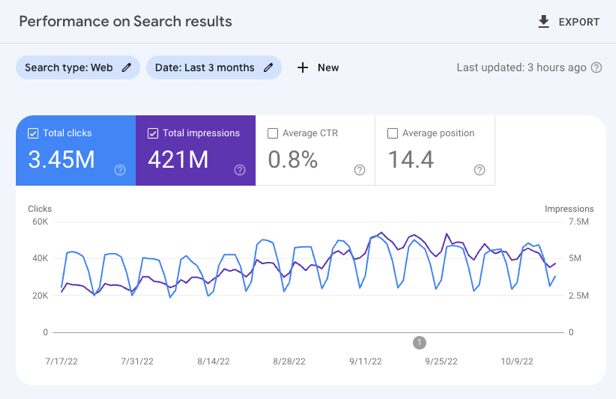
In the Performance tab, you’ll get a few things featured that are really helpful to keep an eye on throughout your SEO campaign:
- Watch your Click-Through-Rate (presented as ‘Average CTR’ in the top tile). This shows how many times users ‘choose’ (through Clicks) your search results listing when they view it (Impressions).
- Watch your Average position. This is your averaged ranking inside of Google search results. Note that the average position CAN go down in a good SEO campaign. How? Ranking on the right keywords is more important than ranking. So trading higher positions on some terms for lower positions on other terms could be really successful from a lead generation standpoint. A good law firm-focused SEO agency can help you pick the right keywords or phrases to target.
- Lower on the Performance page, you’ll see a section with tabs like “Queries” or “Pages” or “Countries.” Queries and Pages are really crucial to monitor. Queries is the actual search phrases you’re ranking on and getting impressions or clicks for, and pages is the pages that are ranking for those terms.
As part of our ongoing SEO campaigns for law firms, we’ll provide up to date reporting for you, as well as provide you access to a custom dashboard that summarizes all this information in a single spot.
Call us at (310) 827-3890 or Email Us

What’s the Second Step in SEO for a DUI Attorney?
Once you have your reporting tools set up, as we covered in step one, you’ll want to ensure that you have claimed and optimized your local business directories and other online directories.
Most of our law firm clients primarily serve particular regions or cities, so local SEO strategies are highly important to their success. We start optimizing local business directories even before we begin optimizing a website for a few reasons:
- Most of the time, you’ll have some baseline SEO optimizations in place for your website content just by the fact that it is created to support likely clients. Almost every lawyer’s website will have a few pages dedicated to practice areas and some basic information about where that law firm is based.
Further optimization will be needed, BUT it can wait a minute. If you’re hiring us, we’ll typically try and budget your campaign to allow us to optimize your website and your local business directories simultaneously, but if you’re DIYing it, then you may not have that kind of time. - Local business directories ALREADY have traffic and most operate based off of a search function. By optimizing your listing there, you have a chance to capture some of their existing audience while also helping to improve your website’s ranking inside of Google and other major search engines.
What directories should you focus on?
Top of the list has to be Google Business Profile (GBP), formerly known as Google My Business. You can create a Google Business Profile page for your business. A GBP shows up in a lot of different spots in Google and can help with your ranking regionally in several different areas:
1. The traditional search results page text listings.
2. The local map listings (in most search queries that Google considers to be local, map listings will show up over the traditional text listings).
3. Featured snippets.
4. The Knowledge Panel.
Here are some screenshots of those in action.
Traditional search results listings.
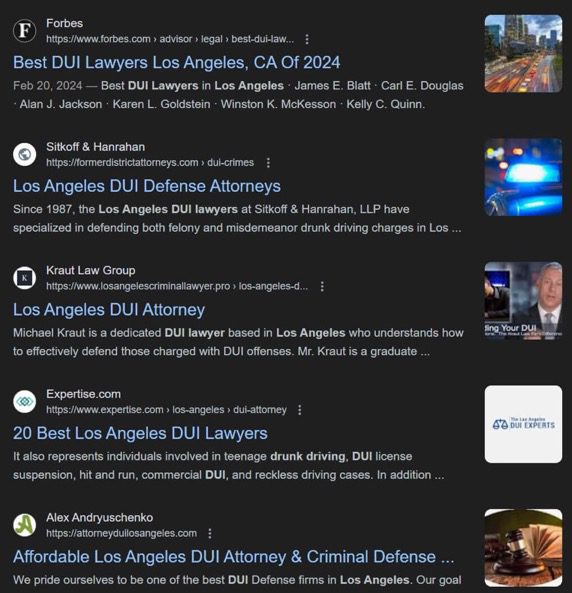
Map listings
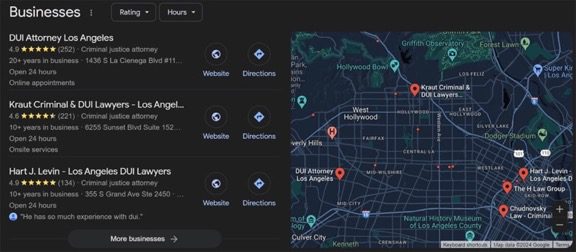
Featured Snippets
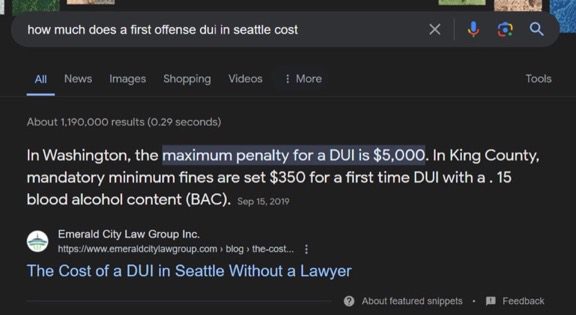
Knowledge Panel or Google Business Profile
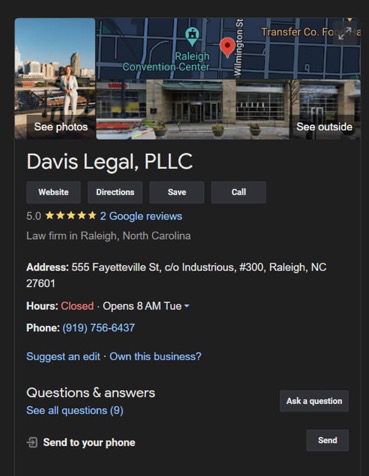
Claiming Your Google Business Profile
Google Business Profiles show up most often when someone is searching in Google Maps, when someone is searching for a business type that Google prefers to show local results for, or when someone is searching for your business specifically.
Claiming, optimizing, and monitoring your Google Business Profile will help you show up more frequently, and it also gives you a greater degree of control over what is published about your business. Google lets anyone submit a business to Google Maps, so there’s a good chance that your practice is already present in search results. However, without a Google Business Profile, you’re unlikely to have prompt control over what that profile shows. Many law firms will have old contact phone numbers, bad reviews, incorrect hours, and more because they haven’t claimed their Google Business Profile and aren’t monitoring it.
Further, bad actors (either black hat SEO agencies, or shady attorneys) frequently edit other businesses’ profiles to redirect your prospective clients to their phone lines, or to mark businesses like yours as closed.
If you have claimed your GBP listing, you’re in a position to monitor and approve many of those changes.
This link explains the process of claiming your Google Business Profile page.
Once you’ve claimed that listing, and you’re in control, here are a few of the basic things that you’ll want to update:
- Ensure the name of your business is accurately represented, AND include keywords in your business name. Google requires that those keywords are actually a part of your business name and will verify that. Setting up a DBA can be a good idea for that reason.
- Make sure your website is correctly linked.
- Update your hours.
- Double-check your contact information.
- Upload some photos of your office and your office building or other nearby landmarks.
- Write a short description of your law firm and your practice focus areas. Make sure to include keywords naturally.
- Set up a calendar reminder to make shorter, social media-like posts on GBP periodically.
- Share promotions or other discounts or incentives that you’re running.
- Reach out to past clients and ask them to leave reviews on your GBP listing.
- Continually ask for positive reviews from your satisfied clients. People are naturally more inclined to leave negative reviews, so make sure to ask your average client for a positive review. Review text and ratings can also play a role in certain rankings.
Once you have your Google Business Profile listing up to date and optimized for keywords, consider spending some time claiming and updating the following profiles:
- Yelp
- Apple Maps
- Bing Places
- Attorney directory sites, like Avvo, Superlawyer, Findlaw, etc.
We’ve included links above to help you on your way. All open in new tabs!

A few things to remember as you set up each of these-
1. Write keyword-optimized, unique content for each of them. Make that content unique (don’t cross-populate) and targeted towards likely users of those sites.
2. Make sure your contact information is consistent- try and avoid variations on your domain name, hours, email address, etc.
3. FULLY populate each- most search tools on these websites or apps will favor businesses that have fully completed and up-to-date listings.
4. Track the logins for each. So many Coalition clients come to us having lost their logins for older profiles and it really can create unneeded headaches.
As with step 1, if you’re tired already, then go ahead and shoot us an email at [email protected], and our Strategy team can start working with you on a budget for your practice.
What’s the Third Step in SEO for a DUI Law Firm?
Optimize your website content.
We mentioned holding off on this activity in the last step, but today’s the day to begin optimizing the content for your law firm’s website.
In theory, if you put together a website that halfway-decently describes your practice areas, you’ve already got some basic optimizations in place. We’re going to talk through some basic principles that you’ll want to make sure you execute on as you make further improvements, AND as you start to produce recurring content.

Here are the basic SEO rules for content optimization:
1. Prioritize prominence.
2. Stay focused.
3. Stay unique.
4. Be client-centric.
Prioritizing prominence means you want to ensure that the most visually prominent areas of your website and content are the ones that are best optimized. What constitutes visual prominence?
- Content that is higher on a page is more likely to be read, therefore it’s more prominent. Think about what kind of text and content you have above the fold on each page- is it keyword-rich? Does it clearly communicate the purpose of the page and what I want its audience to do?
- Content that is more frequently visited or accessed by your clients or prospective clients is more prominent. For instance, your home page is more likely to be read than most other pages on your site, so its content optimizations will generally matter more to your SEO.
- Content that is styled to stand out, is likely to draw the users’ eyes. Has it been optimized for your SEO objectives? Or your conversion objectives?
Stay focused is a principle that means you want each page to have a clear purpose. This page is all about SEO for DUI attorneys, so it covers an exhaustive set of tips specific to DUI lawyers.
Each page of your site should focus on a clear topic and purpose, and that should be evidenced in specific keywords being assigned thematically to certain pages.
Google fields millions of unique queries every day often expressing specific user intent based on the way that keywords are put together to form phrases. More focused content often helps you rank better on long tail (longer, more specific) keywords faster.
Staying unique means not re-using copy and content from page to page. Many lawyers run short on time and end up deciding to copy and paste big chunks of copy throughout their site- don’t do it. Google doesn’t like it and nor do your clients.
If you need help writing unique, keyword-optimized copy, contact Coalition’s SEO team.
Finally, be client-centric. This should be pretty obvious, but lots of SEO companies lead their clients astray by getting them to write copy that is only for search engines. Great SEO copy ranks better because it helps to answer and address specific DUI client questions, concerns, and needs. Google is quite capable of helping to match user intent to content that addresses that intent. Content that is accessible and readable goes a lot further than keyword-stuffed SEO copy.
Here are a few basic content and website optimization rules to consider:
- Make sure title tags are optimized for the specific search terms that page is related to. Title tags are usually edited from the administrative side of your content management system. These short sentences or phrases typically appear at the top of your browser window or tab and also in search results as the blue hyperlinked text. Try to keep the title tag under 60 characters whenever possible. If you can, put the keyword early in the title tag as well.
- Meta descriptions are also a key bit of SEO content. These short, one to two sentence lines of text appear nowhere except under the title tag in search results pages. Like title tags, feature your keyword early in the meta description and prominently. Write these as appeals to search audiences to visit your site- what’s interesting or helpful about this page? Why should someone visit your firm’s website over another lawyer’s? Keep these under 160 characters.
- Page titles are usually the most prominently positioned, and styled text. Sometimes they will be marked up with an H1 tag. Keep page titles clear, concise, and keyword-optimized.
- Body copy is important on most pages of your site. Clients WILL read what you write if you put something in front of them. Make it useful and relevant to the page’s purpose. Try and target 250+ words per page, where it makes sense.
- Mix up body copy with imagery and other media content to help keep it engaging.
- Create helpful, keyword-optimized links between different pages of your site periodically. This helps Google index more of your content, establish the relationship between pages, and helps your site visitors learn more.
Featured Projects
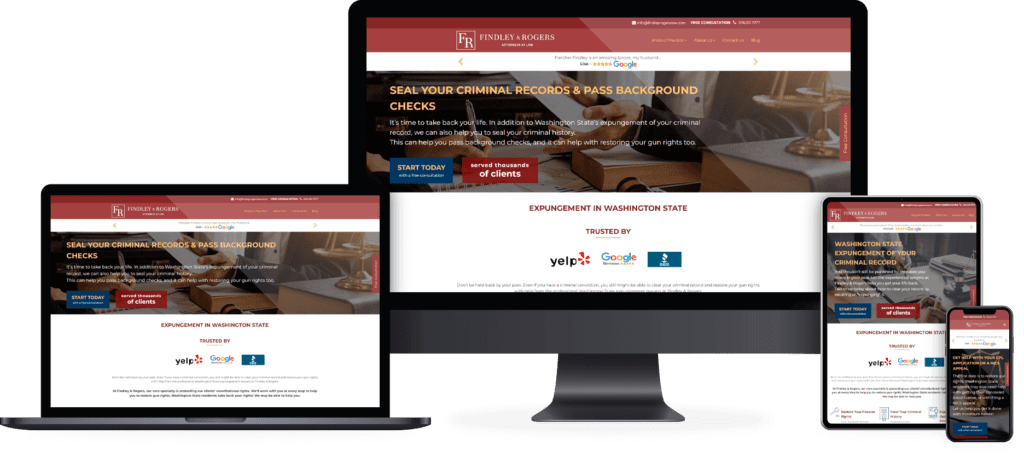
Findley and Rogers Law
Learn how we increased traffic to their site by 198%, as well as the volume of inquiries for this Seattle-based law firm.
Is That Everything? What Other Things Should DUI Attorneys Do For SEO?
That’s hardly all! Outside of the techniques already covered, there’s link building, content marketing, ongoing CRO work, technical optimizations, and more! BUT those things require time and unique strategies to execute well, so it’s best to start here. And that leads us to the final point.
You Need a DUI Attorney SEO Agency
There are as many types of SEO companies as there are types of businesses. Some firms focus on corporations, while others favor small businesses; some firms work exclusively with specific industries, while others have a broader reach; some emphasize the marketing aspects of SEO, while others emphasize the technical.
You have many worthy choices at your disposal, but the most important thing is that you select a firm that understands the unique complexities of DUI law. Your chosen firm must be familiar with the terminology, the legal processes, and the do’s and don’ts of legal marketing.
Coalition Technologies – A SEO Firm Specializing In Attorneys
At Coalition Technologies, our expert team has worked with DUI attorneys in Seattle, Los Angeles, and several other highly competitive markets. We understand what you’re up against. We know that your competitors are working tirelessly to defend their search engine rankings, and we know what it takes to achieve that competitive edge even when it seems impossible.
If you’re tired of struggling in vain to make any headway with the search engines, call us for a free quote at (877) 989-7187 and learn more about our highly effective strategies and success stories. In the immortal words of attorneys everywhere, we’ll fight for you!
Coalition Technologies Reviews
4.8 ★★★★★ 123 REVIEWS


